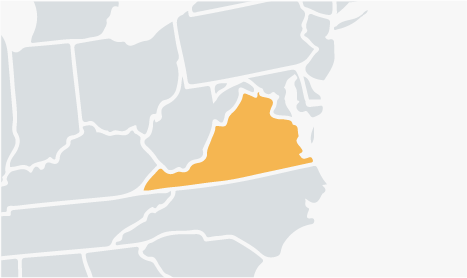| Subgrades | |
| Covered Speech: | A+ |
| Anti-SLAPP Procedures: | D- |
| Subscores | |
| Covered Speech: | 100 out of 100 points |
| Anti-SLAPP Procedures: | 10 out of 100 points |
| Detailed Scoring on Anti-SLAPP Procedures | |
| Suspension of Court Proceedings Upon an Anti-SLAPP Motion: | 0 of 20 points |
| Burden of Proof on Plaintiff to Defeat an Anti-SLAPP Motion: | 0 of 12 points |
| Right to an Immediate Appeal: | 0 of 25 points |
| Award of Costs and Attorney Fees: | 10 of 40 points |
| Expansive Statutory Interpretation Instruction to Courts: | 0 of 3 points |
State Anti-SLAPP Statute
Virginia’s anti-SLAPP statute[1] protects “statements (i) regarding matters of public concern that would be protected under the First Amendment to the United States Constitution made by that person that are communicated to a third party or (ii) made at a public hearing before the governing body of any locality or other political subdivision, or the boards, commissions, agencies and authorities thereof, and other governing bodies of any local governmental entity concerning matters properly before such body.” The footprint of this anti-SLAPP statute is relatively sparse when compared to those of other jurisdictions: it provides for no impact on discovery proceedings, it creates no burden that the respondent must meet when faced with an anti-SLAPP claim, and it contains no provisions for interlocutory appeal of an order on an anti-SLAPP motion. In the event a court provides relief under the statute, the court may award costs and attorney fees to the prevailing party.
How to Improve Virginia’s Score
Virginia’s anti-SLAPP law protects as many types of speech as any other state. Where the law falls short is in its weak statutory procedures to protect speakers facing weak or frivolous lawsuits. If Virginia adopted the procedural protections in the Uniform Law Commission’s model law, it would be one of just a few states in the nation to have a perfect 100% score.
More information about the model UPEPA law is available here.












